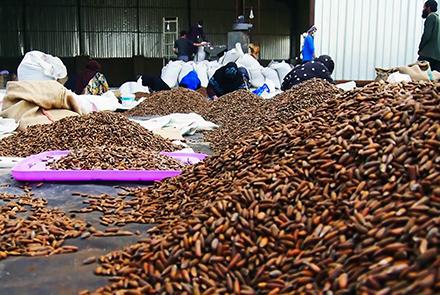The price of pine nuts has risen sharply in local markets following the inauguration of an air corridor between Afghanistan and China, a number of dried fruit and nut retailers said on Sunday.
Currently, the price of one kilogram of pine nuts is around 2,800 AFs in local markets, while eight months ago, it was sold for 1,500 AFs.
“Pine nuts are in demand, people buy them a lot. This year, the price has risen to 3,000 AFs because of its increased export,” said Haseebullah, a pine nut seller in Kabul.
“Last year, pine nuts were sold from 1,500 (AFs) to 1,800, but this year, the price is about 2,800 to 3,000 because of the exports,” said another seller, Obaidullah.
Afghanistan Chamber of Commerce and Industries (ACCI) meanwhile said air corridors play a vital role in increasing the export of agricultural and other domestic products of Afghanistan.
“The key reason pine nuts has found these prices in Afghanistan’s markets is because of its export to China and European countries,” said Mir Zaman Popal, member of ACCI.
Sameer Rasa, Head of the Public Relations Office of Senior Advisor to the President in Banking and Finance, said that more than 800 tons of pine nuts has been exported to the Chinese market.
“Six hundred tons of pine nuts were exported to China’s Shanghai city through the air corridor,” said Rasa.
According to government atatistics, 20 tons of pine nuts a day will be exported to China until the end of the season this year.
Afghanistan’s total pine nut output is 23,000 metric tons a year, and China is the major importer of the product.
Afghanistan is known throughout the world for its fresh and dry fruits.
Pine nut trees are mostly found in Afghanistan’s eastern provinces of Nangarhar, Laghman, Nuristan, Kunar, Paktia, Khost and Paktika provinces. Pine nuts also constitute one of the major income sources for local people in these areas.
Based on statistics, the overall prices of Afghan black pine nuts is estimated at $2 billion annually.
President Ashraf Ghani last month inaugurated the Afghanistan-China air cargo corridor – an air corridor that will hopefully generate millions of dollars in revenue for Afghanistan yearly.
The Presidential Palace at the time said the new air corridor would be used to export between $700 and $800 million worth of Afghanistan’s pine nuts to China annually.
Health Benefits of Pine Nuts
* Pine nuts are one of the calorie-rich edible nuts. 100g of dry kernels provide 673 calories. Additionally, they comprise numerous health benefits, promoting phytochemicals, vitamins, antioxidants and minerals.
* Their high caloric content chiefly comes from fats. Indeed, the nuts are especially rich in monounsaturated fatty acids like oleic acid which helps lower LDL or "bad cholesterol" and increases HDL or "good cholesterol" in the blood.
* Pine or cedar nuts contain essential fatty acid (the omega-6 fat), pinolenic acid. Recent research has shown its potential use in weight loss by curbing the appetite. Pinolenic acid triggers the release of hunger-suppressant enzymes cholecystokinin and glucagon-like peptide-1 (GLP-1) in the gut. Also, pinolenic acid has thought to have LDL-lowering properties by enhancing hepatic LDL uptake.
* Likewise in almonds, pine nuts too are an excellent source of vitamin E. Vitamin E is a powerful lipid soluble antioxidant, required for maintaining the integrity of the cell membrane of mucosa and skin by protecting it from harmful free oxygen radicals.
* Furthermore, pine nuts are one of the gluten-free tree nuts and, therefore, are a popular ingredient in the preparation of gluten-free food formulas. Such formula preparations can be a healthy alternative for people with wheat allergies and celiac disease.
* Pine nuts are an excellent source of the B-complex group of vitamins such as thiamin, riboflavin, niacin, pantothenic acid, vitamin B-6 (pyridoxine) and folates. These vitamins work as co-factors for enzymes in cellular substrate metabolism inside the human body.
* Furthermore, pine nuts contain healthy amounts of essential minerals like manganese, potassium, calcium, iron, magnesium, zinc and selenium. Pine nuts are one of the richest sources of manganese. Manganese is an all-important co-factor for antioxidant enzyme, superoxide dismutase. Therefore, consumption of pine kernels helps the human body develop resistance against infectious agents and scavenges harmful oxygen-free radicals.

